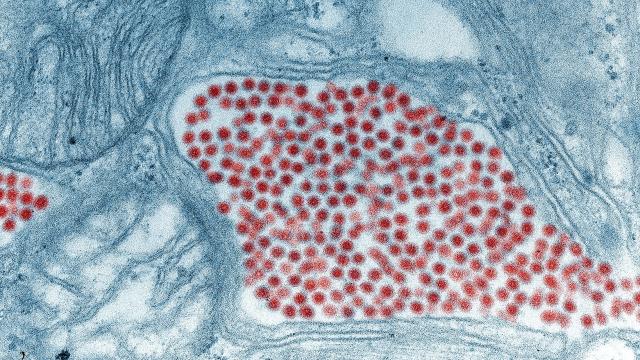One of the most dangerous but thankfully rare mosquitoborne diseases has been spotted again in Florida, U.S.A. state health officials say. According to a public advisory issued this month by the Florida Department of Health in Orange County, the Eastern equine encephalitis virus (EEEV) was found in the state. The virus is capable of causing severe brain damage that can kill up to a third of its human victims.
EEEV can be spread by several species of mosquitoes, including those that make their home along the warmer areas of the U.S. Though many people infected with EEEV either develop no or only flu-like symptoms, around 5 per cent go on to experience serious brain swelling (the titular encephalitis). This swelling can then lead to headaches, drowsiness, convulsions, and coma, with death coming as quickly as two days after symptoms start. And even if you’re lucky enough to survive the experience, you’ll probably be left with lifelong neurological impairment.
The saving grace is that EEEV rarely comes into contact with people. Its primary vector species (the bug that spreads disease) tends to live in swampy areas away from cities. Humans — and ironically horses — are actually a dead end for the virus, since it doesn’t replicate enough in our bodies for other mosquitoes to suck it back up and keep the chain of transmission going.
According to the Centres for Disease Control and Prevention, there are an average seven cases of EEEV diagnosed annually in the U.S. In 2018, there were only six.
Still, Florida is one of the states where EEEV is known to pop up, along with Massachusetts, New York, and North Carolina. Health officials and researchers in the U.S. often use chicken coops as a canary in the coal mine for mosquitoborne diseases like EEEV and West Nile Virus, placing them in endemic areas where mosquitoes like to frequent and testing their blood periodically. According to the health department, the virus was detected in these so-called sentinel birds.
“Several sentinel chickens in the same flock have tested positive for Eastern equine encephalitis virus (EEEV) infection,” the advisory said. “The risk of transmission to humans has increased.”
There’s nothing immediate to panic about here. But diseases like EEEV and West Nile — the most common mosquitoborne disease in the U.S. currently — will undoubtedly become more frequent in the country as climate change rolls along. And right now, there’s no specific treatment or vaccine for EEEV available. So like many things affected by climate change, this awful, if still rare, affliction is poised to harm more people in the not too far-off future.
For those looking to mitigate the risk of mosquito bites, you should use repellants on yourself and your clothing if you’re travelling to the affected areas (repellants made with DEET, picaridin, oil of lemon eucalyptus, para-menthane-diol, and IR3535 are effective, according to health officials).
